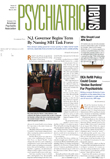With appropriate precautions, placebo-controlled trials of treatment for acute manic episodes and for prevention of manic-depressive episodes can be conducted with minimal risk of suicide.
So report Jitschak Storosum, M.D., Ph.D., and colleagues in the April American Journal of Psychiatry.
In a review of placebo-controlled, double-blind, randomized trials of medication for the treatment of acute manic episodes and the prevention of manic-depressive episodes, they found that suicide was not a significant risk among patients enrolled in placebo groups.
“The results... indicate no greater risk of suicide among patients with acute manic episode or stabilized bipolar disorder who were treated with placebo compared with the risk of patients who were treated with an active compound under the conditions of the trials,” Storosum wrote.
He is with the Medicines Evaluation Board of the Netherlands (a regulatory agency similar to the U.S. Food and Drug Administration).
In the study, all placebo-controlled, double-blind, randomized trials of medications for the treatment of acute manic episode and the prevention of manic-depressive episode that were part of a registration dossier submitted to the Medicines Evaluation Board between 1997 and 2003 were reviewed for occurrence of suicide and suicide attempts.
In 11 placebo-controlled studies of the treatment for acute manic episode that included 1,506 patients in active compound groups and 1,005 patients in placebo groups, Storosum and colleagues found no suicides and no suicide attempts in either group.
In four placebo-controlled studies of the prevention of manic-depressive episode that included 943 patients in active-compound groups and 418 patients in the combined placebo groups, there were no suicides and only two suicide attempts among the patients in placebo groups.
In the active-compound groups in those prevention trials, there were two suicides and eight suicide attempts, according to the report.
Storosum stated that one limitation to the study is the exclusion from placebo-controlled trials of patients who are considered at risk for suicide. But he noted that the suicide rate in the active-treatment arms of the prevention studies was greater than that reported by Frederick Goodwin, M.D., and colleagues in “Suicide Risk in Bipolar Disorder During Treatment With Lithium and Divalproex,” published in the September 2003 JAMA.
This “indicates that patients with bipolar disorder are at high risk for suicide, even if they are considered nonsuicidal and treated with an active compound,” Storosum and colleagues said.
Psychiatrist Maria Oquendo, M.D., who reviewed the report for Psychiatric News, called it a “very well done” study that complements similar studies that Storosum has done looking at suicide risk in placebo-controlled studies of treatment for schizophrenia and depression.
“These studies all show the same thing—that placebo groups do not have an increased risk for suicide,” said Oquendo, a clinical professor of psychiatry at Columbia University College of Physicians and Surgeons.
But she emphasized that researchers performing intervention studies continue to be ethically bound not to include patients at risk for suicide in placebo-controlled trials, and for that reason Storosum's conclusions about the relative safety of placebo cannot be extended yet to high-risk patients.
“As more and more data accumulate, we may be able to change that,” she said. “But until we have more evidence, we are ethically bound to exclude patients at risk for suicide from these studies.”
Oquendo published a report in the August 2004 American Journal of Psychiatry examining strategies for designing randomized, controlled trials that minimize the risk of morbidity and mortality for suicidal patients while providing valuable data on effectiveness of interventions (Psychiatric News, October 1, 2004).
Among her recommendations was not to use placebo controls in such intervention trials. Other strategies:
•
Use of surrogate outcome measures to protect subjects from actual suicidal acts.
•
Implementation of psychosocial interventions to monitor for exacerbation or increased risk.
•
Close monitoring of patients.
•
Retention of subjects in the study protocol in the event of hospitalization.
•
Early detection of large effect sizes.
Am J Psychiatry 2005 162 799
Am J Psychiatry 2004 161 1433
